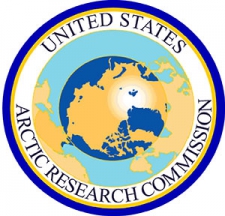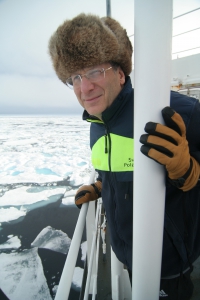By: Ruth Cooper, U.S. Arctic Research Commission (USARC) Intern

The U.S. Arctic Research Commission (USARC) is an independent federal agency that was established in 1984 by the Arctic Research and Policy Act. Its principal duties are to develop and recommend an integrated national Arctic research policy and to assist in establishing a national Arctic research program plan.
Appointments to the Commission

President Obama recently reappointed one USARC Commissioner and named two new ones:
David Benton was reappointed to USARC in February 2016. He is a marine resource consultant and has previously served as Executive Director of the Marine Conservation Alliance. He was originally appointed in June 2012.
Marie N. Greene, appointed by President Obama in December 2015, contributes a wealth of cultural insight and strong senior level leadership experience to the Commission. She previously worked at the NANA Regional Corporation for 20 years, 13 of which she served as president and CEO.
Larry Mayer was appointed to the Commission in May 2016. Dr. Mayer is a Professor and Director of the School of Marine Science and Ocean Engineering at the University of New Hampshire. He has also served as the Director of the Center for Coastal and Ocean Mapping at the University of New Hampshire since 2000.
Working Groups
USARC coordinates several working groups to explore research needs and develop action plans for issues of critical importance in the Arctic. There are currently three working groups facilitated by USARC.
Arctic Renewable Energy Working Group (AREWG)
The AREWG was formed in late 2015 to promote research on renewable and efficient energy systems in remote Arctic communities. Group focus areas include researching new options for home heating and electricity that would increase efficiency and the use of renewable energy while decreasing heating oil consumption; the indirect community benefits of renewable energy and efficiency that do not routinely get included in a typical energy cost/benefit analysis; and increasing the potential for industry investment in remote renewable energy projects. To date the working group has been concentrating on the home heating needs of remote Alaskan villages. A workshop was held in January 2016 to develop a heat-related research plan for rural Alaska. More information is available here.
Arctic Mental and Behavioral Health Working Group (AMBHWG)
The AMBHWG aims to work with tribes and key stakeholders to promote research on, and raise awareness of, the significant behavioral health disparities that exist between Arctic and non-Arctic populations. The group's mission is to strengthen the systems of care to prevent suicide and improve mental health in the circumpolar north, with a specific focus on early intervention approaches for children. During 2016-17, the group will focus on promoting research on behavioral health evaluation of children with the hope of strengthening protective factors prior to a behavioral health crisis; supporting improved information and data sharing with the hope of enabling current systems to better identify and provide assistance to communities in need; and highlighting unmet mental health provider needs in Alaska.

Alaska Rural Water and Sanitation Working Group (ARWSWG)
There are a variety of entities in Alaska working towards improving health outcomes in rural Alaska by providing and improving water services in villages. Since 2010, USARC has been coordinating these groups so that this work is maximally efficient and ideas can be shared across federal, state, Alaska Native, and academic groups. In 2016-17, the ARWSWG plans to focus on capacity, management, and economics in this subject area, with a specific emphasis on management at the local level and how success can be best achieved through working with local communities. Further information about the ARWSWG is available here.
Events
On 28 September 2016, science ministers from over 20 nations will gather in Washington, D.C., for the first-ever White House Arctic Science Ministerial. The event will be co-chaired by Fran Ulmer, Chair of USARC, and France A. Córdova, Director of the National Science Foundation and Ex-Officio Member of USARC. Further information is available here.
USARC's 106th meeting will be held in Washington, D.C. on 29-30 September 2016.
Publications
The ARWSWG released a revised Alaskan Water and Sanitation Retrospective 1970-2005 in June 2015. Focused on techniques deployed in rural Alaskan villages between about 1970 and 2005, the report is available here.
The September 2015 issue of Oceanography, co-sponsored by the Arctic Research Program, Climate Observation Division of NOAA, and USARC focused on the Russian-American Long-term Census of the Arctic (RUSALCA) program. The special issue contains 14 articles that describe joint U.S.-Russian expeditions and follow-on research in the Chukchi Sea and Bering Strait regions. The issue is available online here.
Other News
The new Arctic Executive Steering Committee (AESC) website has been launched and can be found here. President Obama established the AESC with his January 2015 Executive Order, "Enhancing Coordination of National Efforts in the Arctic." The AESC is charged with providing guidance and coordinating priorities and activities across Executive Branch agencies under the National Strategy for the Arctic Region. These responsibilities include improving the coherence of engagement with the State of Alaska and Alaska Native communities and supporting the U.S. Chairmanship of the eight-nation Arctic Council for 2015–2017.
To subscribe to the Arctic Update, a daily email newsletter that keeps readers up to date on Congressional hearings, legislative actions, noteworthy news stories, and future events related to the Arctic, go here.
Further information on USARC activities is available on the USARC website or by contacting John Farrell, USARC Executive Director (jfarrell [at] arctic.gov).
